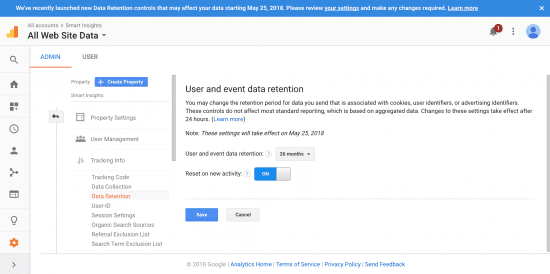Google Analytics has not only made it easier for data-driven marketers to work in compliance with GDPR, but has also introduced a new feature to improve sales and marketing integration
In an era where every marketer is aspiring to be “data-driven”, you, yes you, need to make sure that your marketing decisions are informed by well-rounded data. When we speak about data analytics, Google Analytics is first to make an appearance in any marketer’s mind. Yet another Google tool that has provided revolutionary changes, if we may call it that, in the process of digital data collection, insight and analytics.
Google Analytics is widely used by marketers to generate better business results. Hence, Google is always looking for ways to improve this tool and add new, more relevant features to it. As you may know already, GDPR is around the corner – the new regulation agreed by the European Union, which seeks to improve transparency and effectiveness of data protection activities, is all set to come into play on 25th May 2018.
Leading up to the data protection wave, Google Analytics has introduced data retention control that can be adjusted by the admins. The new “Google Analytics Data Retention controls give [you] the ability to set the amount of time before user-level and event-level data stored by Google Analytics is automatically deleted from Analytics’ servers”, announced Google. The settings will also take effect 25th May 2018, the day GDPR comes into play.
It’s important to note that by default, GA’s Data Retention settings have set its retention levels at 26 months and the “reset on new activity” option is turned ON. If you’re an admin on your Google Analytics account, you will have the option to a data retention of: 14 months; 26 months; 38 months; 50 months; or Do not automatically expire. There will be no implications on the aggregate data if certain user-data is deleted. However, if you don’t wish to reset data retention for a user, you can turn this option off.

It’s safe to say that this new feature introduced by Google will help marketers to effectively work in compliance with GDPR, as far as data retention on GA is concerned. However, as mentioned above, Google Analytics is widely used by marketers to generate better business results. But what if you could generate even better results, with its newest Calendly integration feature? GDPR help is not the only thing that GA is offering this month!
For those of you who use Calendly to organise your meeting times with prospects or other team members, the platform has introduced an integration with Google Analytics to allow you to measure campaign funnels and conversions.
As Calendly states, “with [this] new integration, you can track each step of the scheduling process for your events in Google Analytics, including when an invitee:
- Lands on your Calendly scheduling page
- Chooses an event
- Selects a day
- Selects a time
- Confirms a meeting”
For those of you who have admin access, you can now create a goal Google Analytics to record scheduled meetings as conversions and effectively measure campaign performance. Through this new integration, you can see which campaigns are driving the most meetings and thereby, make insightful improvements to your campaigns!